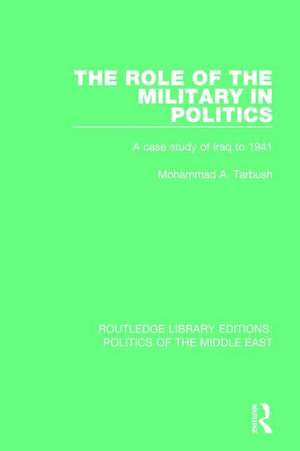The Role of the Military in Politics: A Case Study of Iraq to 1941: Routledge Library Editions: Politics of the Middle East
Autor Mohammad A. Tarbushen Limba Engleză Paperback – 12 dec 2016
| Toate formatele și edițiile | Preț | Express |
|---|---|---|
| Paperback (1) | 325.34 lei 6-8 săpt. | |
| Taylor & Francis – 12 dec 2016 | 325.34 lei 6-8 săpt. | |
| Hardback (1) | 1058.65 lei 6-8 săpt. | |
| Taylor & Francis – 20 iul 2015 | 1058.65 lei 6-8 săpt. |
Din seria Routledge Library Editions: Politics of the Middle East
- 12%
 Preț: 330.57 lei
Preț: 330.57 lei - 13%
 Preț: 323.44 lei
Preț: 323.44 lei - 12%
 Preț: 327.58 lei
Preț: 327.58 lei -
 Preț: 303.92 lei
Preț: 303.92 lei - 12%
 Preț: 327.58 lei
Preț: 327.58 lei - 14%
 Preț: 325.34 lei
Preț: 325.34 lei - 13%
 Preț: 297.62 lei
Preț: 297.62 lei - 13%
 Preț: 295.10 lei
Preț: 295.10 lei - 14%
 Preț: 300.01 lei
Preț: 300.01 lei - 13%
 Preț: 322.51 lei
Preț: 322.51 lei - 13%
 Preț: 297.15 lei
Preț: 297.15 lei -
 Preț: 320.36 lei
Preț: 320.36 lei - 12%
 Preț: 325.34 lei
Preț: 325.34 lei -
 Preț: 457.14 lei
Preț: 457.14 lei -
 Preț: 310.67 lei
Preț: 310.67 lei - 12%
 Preț: 329.14 lei
Preț: 329.14 lei - 12%
 Preț: 325.84 lei
Preț: 325.84 lei - 14%
 Preț: 299.52 lei
Preț: 299.52 lei - 12%
 Preț: 329.26 lei
Preț: 329.26 lei - 12%
 Preț: 326.29 lei
Preț: 326.29 lei -
 Preț: 284.52 lei
Preț: 284.52 lei
Preț: 325.34 lei
Preț vechi: 371.71 lei
-12% Nou
Puncte Express: 488
Preț estimativ în valută:
62.25€ • 65.17$ • 51.51£
62.25€ • 65.17$ • 51.51£
Carte tipărită la comandă
Livrare economică 05-19 aprilie
Preluare comenzi: 021 569.72.76
Specificații
ISBN-13: 9781138925908
ISBN-10: 113892590X
Pagini: 310
Dimensiuni: 156 x 234 mm
Greutate: 0.45 kg
Ediția:1
Editura: Taylor & Francis
Colecția Routledge
Seria Routledge Library Editions: Politics of the Middle East
Locul publicării:Oxford, United Kingdom
ISBN-10: 113892590X
Pagini: 310
Dimensiuni: 156 x 234 mm
Greutate: 0.45 kg
Ediția:1
Editura: Taylor & Francis
Colecția Routledge
Seria Routledge Library Editions: Politics of the Middle East
Locul publicării:Oxford, United Kingdom
Public țintă
Postgraduate and UndergraduateCuprins
1. The Beginning of the State 2. Structural Instability 2.1. The Structure and Distribution of the Population 2.2. The Tribes and the System of Land Tenure 3. The Creation of the State 3.1. A Review of British Interests in Iraq Between the Two World Wars 3.2. The Creation of the Monarchy 3.3. The Iraqi Political System 3.4. The Structure of the Iraqi Cabinet from October 1920 to October 1936 3.5. The Nature of Opposition Between 1920 and October 1936 4. The Army 4.1. The Formation of the Iraqi Army 4.2. Organisation and Composition 4.3. The Expansion of the Army, 1921-36 5. First Ventures of the Army into Politics 5.1. The Assyrian Question 5.2. The Significance of King Faisal’s Death 5.3. Revolt and Containment: the Tribal Uprising of 1935-6 6. The Bakir Sidqi Coup of October 1936 6.1. The Possible Causes of the Coup and the Ideology and Social Characteristics of its Leaders 6.2. The Attitude of the King 6.3. The Attitude of Britain 6.4 The End of the Coup Government 7. Coups and Counter-Coups 7.1. Iraqi Governments Between August 1937 and May 1941 7.2. The Fourth Coup 8. The Rashid ‘Ali Coup and British Intervention 9. Conclusions Appendix 1. The Programme of the Popular Reform League Appendix 2. Translation of ‘Programme of Policy’ Issued by the Cabinet of Saiyid Hikmat Sulaiman Appendix 3. Kurdish Petition Appendix 4. Anglo-Iraqi Treaty of alliance, 30 June 1930
Descriere
This book, first published in 1982, attempts to explain how and why Iraqi military intervened in the affairs of state between 1936 and 1941. The intention is not to describe the various coups of this period, but to explain the gradual assumption of a political role by the Iraqi army and the contributing factors at play, for example the fragmented nature of Iraqi society and the presence of the British. In addition, an understanding of the political role of the Iraqi army requires a thorough investigation of the development of the Iraqi state itself.
